Rugby Plasterers: When your home in Rugby needs some plastering work doing, it doesn't matter whether small or large, you'll be wanting to find a skilled and professional plasterer to do the job with much care and attention. It can take several years to master the art of plastering, so it isn't advisable for you to try to do it yourself.
When trying to achieve a number of home restoration tasks, you've got to consider the likelihood of plastering work being necessary. It could be things such as applying some screeding, plaster skimming a dry lined partition, rendering a section of wall or installing mouldings or coving before decorating. Don't however imagine that those are the only plastering, rendering and screeding tasks which may be required, because there are certainly lot's more possibilities.
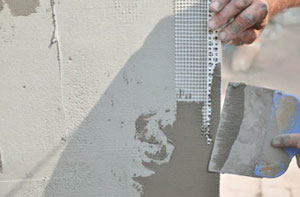
Using a plasterer who knows just what they are up to is the most important thing, so ask prospective Rugby plasterers to show you a portfolio of their accomplished projects. For this type of work, you definitely don't want to be employing "cowboys". Inferior plastering can result in big problems later on, and it may not even be evident until the decorating starts.
It is when the painting and decorating commences that any imperfections become blindingly obvious to the naked eye. This effect will be even more accentuated when the uneven surfaces are viewed in bright sunlight. It really is a no brainer that you should steer clear of poor tradespeople, and select only from competent plasterers in Rugby.
The key attribute of plastered surfaces is that they are smooth and flat, forming a level base for decorative materials to be put onto them. It is very simple to fill and repair any trivial cracks and blemishes, but it is tricky to conceal fundamentally uneven surfaces. Trouble with the installation of kitchen units, the painting of the surfaces, the fitting of architraves and any area of wall tiling, can result from a shoddily plastered area.
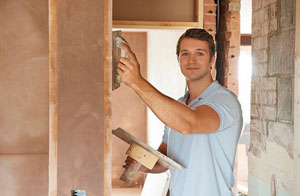
The aim of the most skillful Rugby plasterers is to get a polished finish directly from the trowel, and you should count on nothing less. Any professional plasterer will tell you that a properly plastered wall or ceiling shouldn't ever need sanding down to achieve a nice finish. If the plastering has not been done properly, vigorous sanding may be needed, and calls the plasterers skills into question. You should be extremely wary if you see the electric sanding machines being plugged in.
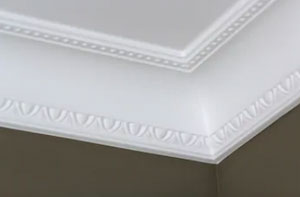
A common reason for calling in a plasterer in recent times, is to plaster over an artex ceiling. The "in" finish for ceilings in the 1970's and 1980's, artex is not so widely used in Rugby currently. Plastering over that old artexed ceiling to make it look more sleek and modern is something that most plasterers in Rugby will be happy to do. On the reverse side, most plasterers will also apply artex to your ceiling if you have a yen to bring back that 70's style.
Do-it-Yourself Plastering Rugby: While it's always better to bring in a competent plasterer in Rugby when you have plastering work that should be carried out in your home, it is quite possible to have a crack at doing it yourself if you are really good at do-it-yourself, and have the self-confidence to tackle it. Picking a wall that already has an inaccurately plastered finish is a great idea to start with, so that your novice plastering endeavours cannot make it any worse. An out-of-sight area or a spare bedroom would be a good place to start. This will be less stressful for you, and enable you to spend a little while testing out your newly acquired skills. You will probably make rather a mess of plastering on the first attempt, but you don't have to worry because it's quite possible to skim a wall as many times as you like.
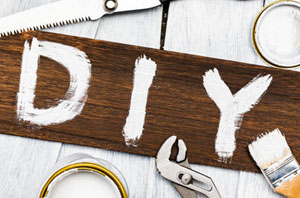
If you're on the lookout for some tips and advice to help you on your way, you might consider watching some YouTube video tutorials. Or, if you're really keen to learn plastering you might even think about signing up for a course at a nearby college. Plastering is of course "hands on" undertaking and the more you practice the more accomplished you become. You could even come up with some of your own techniques for getting that perfect plastered finish, however the tried and true ways are normally best. The more frequently you do it the more confident you will get, and in the final analysis - plastering is all about confidence. You can attempt some more complex plastering tasks once you've mastered the skill to a reasonable degree. You've still got the option of contacting a reputable Rugby plasterer if you mess it up.
Tools for Plastering
When plastering work needs doing in Rugby, most tradespeople and DIY enthusiasts will discover that they haven't got all the specialist tools that are necessary to do a proper job. Which is the reason why in the majority of cases a professional plasterer will be necessary for this sort of work. Listed here are merely a handful of the tools that a skilled plasterer will make use of:
- Plasterer's Trowel
- Plastering Float
- Board & Door Lifter
- Scarifier
- Dry Lining Rasp
- Plaster Pan & Buckets
- Jointing & Taping Knives
- Plaster Mixing Paddle
- Edging Trowel
- Finishing Trowel
- Plastering Rule
- Plasterer's Hawk
Screeders Rugby
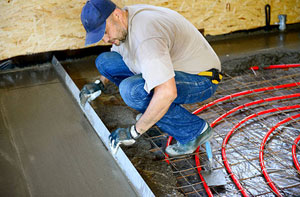
Screeding is a technique through which a new level floor surface is established by the use of a cement and sand mix. Typically screeding is applied over a concrete sub-floor to cover underfloor heating pipes, to be used as a finished hardwearing floor surface or to take on the final floor finish. Greater quality, finish and durability is the effect of a professionally laid screed. Screed should only be mixed by hand where relatively small areas of floor are being worked on. For more substantial projects, a good screed pump needs to be used to produce an even and smooth blend of cement and sand, which can then be pumped directly to the required location. Amongst the many different kinds of screeds are: bonded screed, free-flowing screed, fast drying screed, traditional screed, unbonded screed, floor levelling compound and structural screed.
Pebble Dashing Rugby
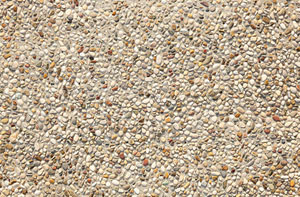
Pebble Dashing Rugby: Pebble dashing (or roughcast) has been used for many years to protect and decorate the outsides of homes. Although traditionally it's not loved by everyone. Rugby plasterers will sometimes do this kind of project for you, although there are pebble dash specialists working in the area.
Pebble dashing (or pebbledashing) is a type of exterior wall covering which normally consists of 2 layers of a base made of lime and sand onto which small pebbles or gravel are pressed to create a strong, decorative and maintenance free finish on both new and renovated houses. (Tags: Pebble Dash Rugby, Pebble Dashing Rugby, Pebble Dashers Rugby, Pebble Dash Removal Rugby)
Polished Plastering Rugby
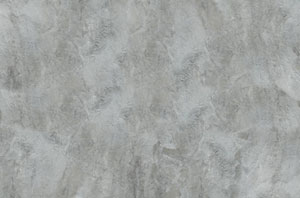
Polished Plaster Rugby: Exceptionally popular these days, polished plaster is a modern form of timeless Italian plasterered finishes. Describing anything from rugged textured plasters to highly polished Lucidato, Marmorino and Venetian plasters, the expression "Polished Plaster" in fact covers a number of prime quality plaster finishes. Polished plaster is normally used on interior walls and ceilings, to offer a finished surface that looks like polished travertine, marble or limestone. Polished plaster has natural shade variations delivering an impression of depth whilst still smooth when touched. Unique bespoke finishes can be achieved by combining these different sorts of plasters. With the use of natural or artificial colourants polished plaster can take on attractive tints or colours. The possibility to tint Venetian plaster is especially beneficial when a certain "marbled" style is required, or when a colour which doesn't exist in nature is the goal. For more information regarding polished plaster, pay a visit to the Wikipedia page HERE. (Tags: Polished Plastering Rugby, Polished Plaster Rugby, Venetian Plaster Rugby, Marbled Plaster Rugby)
Plasterboarding Rugby (Dry Lining)
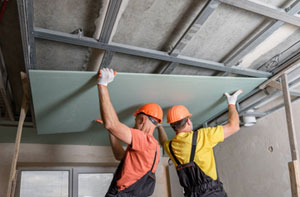
Dry Lining Rugby: Dry lining is often required in home refurbishment projects, and you should be able to find lots of plasterers in Rugby who can provide this particular service. A procedure which produces a stable wall surface that does not need to be plastered, plasterboard is attached to metal framing, a brickwork surface or a wood studding or joist. In some cases the plasterboard surface itself is decorated, though mostly it will be skimmed with a fine coat of finishing plaster, which can be wallpapered or painted without the need for filling. In terms of fittings, when attaching plasterboard to wood stud or joists, drywall screws or nails are used, when attaching to a brickwork or masonry wall "dot and dab" bonding compound is used and when attaching to a metal framework self-drilling, self tapping (Jack-Point screws) are used. (Tags: Dry Liners Rugby, Plasterboarding Rugby, Dry Lining Rugby)
Artexing Rugby

Artexing Rugby: Even though more common throughout the Seventies and Eighties artex continues to be a great way to improve the appearance of a ceiling, especially a shabby or cracked one. It's not quite as easy to locate a plasterer who will do artexing presently, whereby in the past you could find tons of tradesmen who did nothing but artex and artex removal. With designs and styles like bark, swirl, pairs, stippled, broken leather, scroll, medusa, basket, hook & line, criss-cross or circles, there appeared to be something for everyone. Artex patterns were available to fit any taste or preference. It is of course still quite possible to get any one of these artex ceiling patterns done today, you'll simply have to locate a tradesman (a plasterer rather than a handyman) ready to tackle it. The one disadvantage of artex, and one that brought about its drop in popularity, is it's difficult to repair or patch.
Renderers Rugby
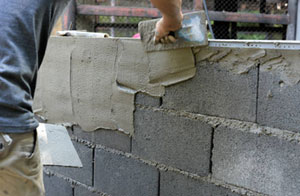
Rendering Rugby: The procedure of applying a mixture of cement, lime, sand and water to both interior and exterior walls to obtain a smooth or textured surface finish, is called rendering, which is a fairly similar trade to plastering. Rendering is a popular method across Europe and is particularly common in the Mediterranean region. A rendered surface is mostly employed for aesthetic reasons but is additionally waterproof and has some fire retardant properties. There are a couple of ways that a rendered wall can be coloured, either you can apply paint as soon as it is dry, or colours can be added to the render mix itself, producing a finish which is much longer lasting and more resilient.
Plasterer Rugby
A plasterer in Rugby is a professional craftsman who works exclusively with plaster, carefully spreading a smooth layer of plaster over an otherwise rough and unglazed surface. Plastering as an occupation has been around for 100s of years, while the general technique has been used in construction for millennia. In today's world, plaster is used to produce an even and smooth surface on the interior walls of domestic and commercial premises. Plaster is on occasion used to form decorative and elaborate mouldings and cornices that can be used for embellishing the interior ceilings and walls of rooms. Playing an essential role in a lot of home building projects in Rugby, plastering is also used in the the construction of porches, garages, extensions and attic conversions. (Tags: Plasterers Rugby, Plasterer Rugby, Plastering Rugby).
Plastering Tasks Rugby

Rugby plastering specialists can usually help with Marmorino plastering in Rugby, skirting board installation, monocouche rendering, drop ceilings, plastering over artex, bonding Rugby, dry lining and plastering ceilings, cornices and ceiling roses, plasterboard skimming, recessed TV walls, pebble dashing restoration, external screeding and rendering, relief plastering, stucco plaster, magnetic plastering, dot and dab plasterboarding, plaster removal Rugby, plastering quotes Rugby, fibrous plaster, ceiling overboarding Rugby, the fixing of coving, the rendering of brickwork in Rugby, patch plastering, decorative mouldings, pitted plaster, re-skimming plaster ceilings and walls, blown plaster, rendering with sand and cement, self-levelling screeds in Rugby, dragged plaster Rugby and other plastering work in Rugby, Warwickshire.
Rugby Plastering Services
- Rugby Artex Covering
- Rugby Plaster Skimming
- Rugby Soundproofing
- Rugby Plastering Quotes
- Rugby Cornice Installation
- Rugby External Rendering
- Rugby Domestic Plastering
- Rugby Plastering
- Rugby Float and Set
- Rugby Plasterers
- Rugby Plasterer
- Rugby Plastering Courses
- Rugby Artexing
- Rugby Plaster Patching
Other Useful Trades in Rugby Warwickshire

Not surprisingly, whenever you are doing home remodeling in Rugby, Warwickshire, you'll probably be in need of all kinds of different tradespeople and together with a plasterer in Rugby, Warwickshire, you might also need plaster mouldings in Rugby, bricklaying in Rugby, rubbish removal in Rugby, pebble dashers in Rugby, dry lining services in Rugby, external wall insulation in Rugby, tiling in Rugby, internal rendering in Rugby, cornice fitters in Rugby, dry liners in Rugby, carpenters & joiners in Rugby, artexers in Rugby, polished plaster in Rugby, electric socket installation in Rugby, wallpaperers in Rugby, screeding specialists in Rugby, building contactors in Rugby or domestic cleaners in Rugby.
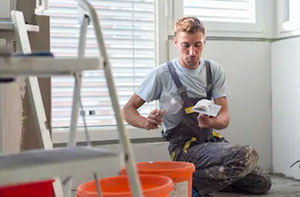 Plasterers Rugby
Plasterers Rugby Plastering Near Rugby
Plastering Near Rugby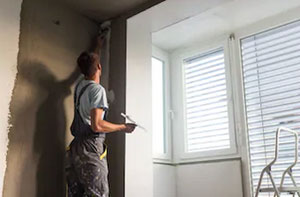 Plasterer Rugby
Plasterer RugbyPlastering Jobs Rugby: Get plastering jobs in Rugby here: Plastering Jobs Rugby
More Warwickshire plasterers: Royal Leamington Spa Plasterers, Atherstone Plasterers, Whitnash Plasterers, Southam Plasterers, Kenilworth Plasterers, Polesworth Plasterers, Nuneaton Plasterers, Warwick Plasterers, Stratford-upon-Avon Plasterers, Kingsbury Plasterers, Studley Plasterers, Wellesbourne Plasterers, Bedworth Plasterers and Rugby Plasterers.
Artexing Rugby - Screeding Rugby - Plasterers Rugby - Plastering Rugby - Polished Plaster Rugby - Decorative Plastering Rugby - Rendering Rugby - Cheap Plasterer Rugby - Plasterboarding Rugby





